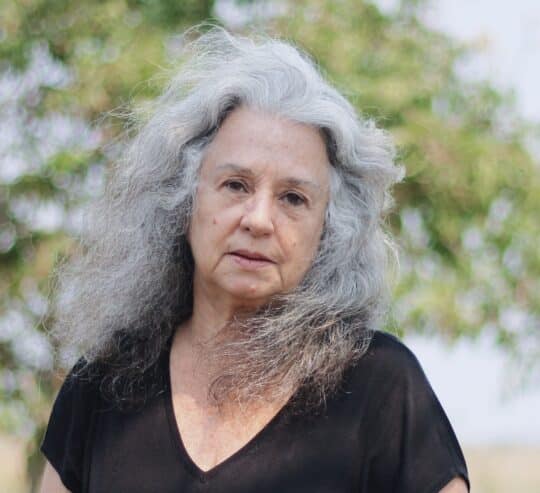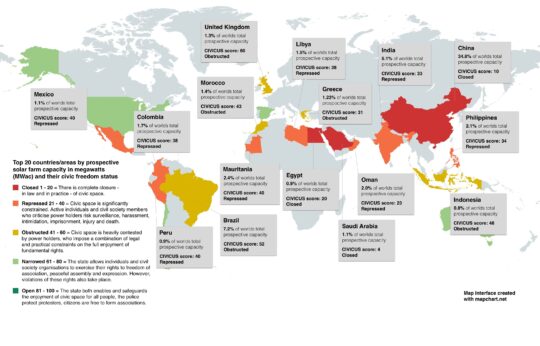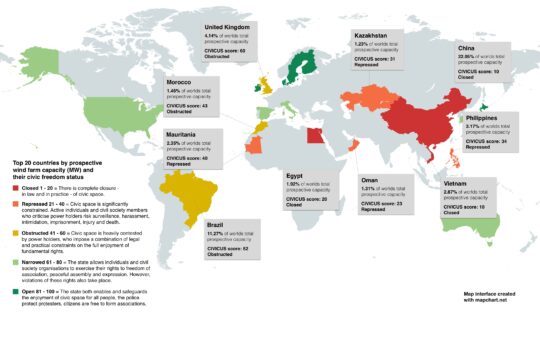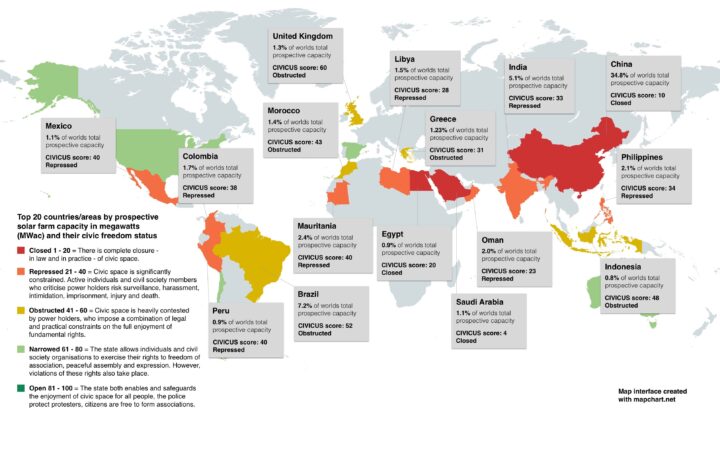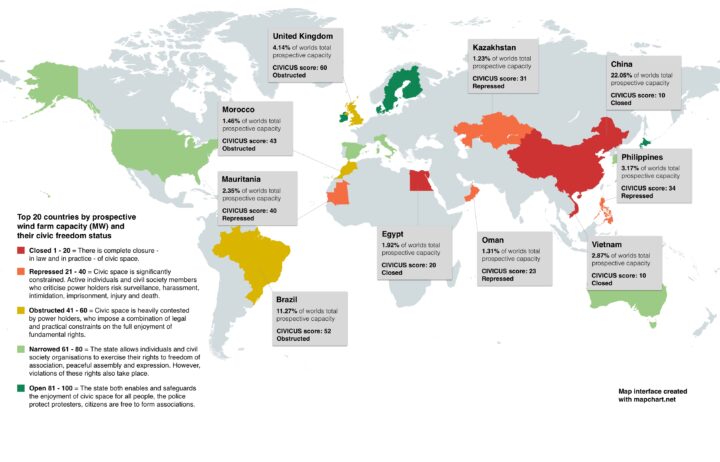HUMAN RIGHTS DEFENDERS AT RISK IN THE TRANSITION TO GREEN ENERGY
Many renewable energy projects are set to be implemented in countries with restricted civic space, putting human rights defenders and local communities at risk of serious reprisals. Drawing on four case studies, a new Swedwatch report provides key recommendations for governments, companies, and investors to better safeguard the rights of human rights defenders in the renewable energy transition.
As renewables expand, so does the need for land
To limit global warming to 1.5°C, renewable energy capacity must triple by 2030, with 90% of electricity being generated from renewables by 2050. A rapid expansion is already underway worldwide, with solar and wind power leading the transition.
While the expansion of renewables is crucial to mitigate climate change, the projects often require vast land areas, risking to cause adverse human rights impacts and to exacerbate tensions with local communities as they affect access to livelihoods and natural resources.
Expansion of renewables in high-risk areas for defenders
Moreover, much of this expansion is happening in countries with restricted civic space and weak human rights protections. In fact, over half of the world’s future wind capacity and two-thirds of its solar capacity are expected to be developed in countries with limited civic freedoms. This puts communities — and especially human rights defenders* — at serious risk of harassment, legal persecution, and even deadly violence.
Documenting undocumented risks related to renewables
The report Renewables and Reprisals, written by Swedwatch, presents a new global mapping of high-risk areas for defenders in the renewable energy transition (see maps in the sidebar). By outlining areas where limited civic space overlaps with rapid solar and wind power expansion, it identifies areas where defenders face heightened risks.
It also presents four case studies — from Mozambique, Honduras, Brazil, and the Philippines — where affected community members and human rights defenders report violations of their human rights in connection to the development of renewable energy projects. While not exhaustive, these cases illustrate how restricted civic space and weak safeguards put defenders at risk, highlighting issues across different energy sectors and regions.
*Who is a human right defender and why do they matter 🔍
The term “human rights defender” refers to individuals or groups who peacefully advocate for and protect human rights. The report Renewables and Reprisals places a special focus on human rights defenders, as their informed voices are essential in representing communities and ensuring a just energy transition.
We believe the environmental impact assessments done for the project (referring to a hydropower project in Mozambique Ed. note) are a fraud and that communities affected have never had access to the information they need to be able to take a decision if they want this project on their lands.
Photo: Right Livelihood
Businesses need to address defenders-related risks
Swedwatch contacted the companies and investors mentioned in the report for their comments. Most companies responded and affirmed their commitment to human rights and environmental standards. However, the stark contrast between their statements and the defenders’ experiences highlights a troubling gap between commitment and compliance. (Learn more about the case studies and read the full company responses further down 👇🏼.)
The report underscores the urgent need for stronger protections for human rights defenders along with transparent consultation processes, and corporate accountability. It provides key recommendations for governments, companies, and investors on how to take appropriate action in line with international human rights guidelines.
Without immediate action, the rapid expansion of renewable energy risks repeating the same human rights abuses seen in industries such as mining and agribusiness, rather than fostering a truly just energy transition. /Alice Blondel, Director of Swedwatch
What needs to change?
Key recommendations for governments:
✔️ Strengthen mandatory human rights due diligence (HRDD) laws.
✔️ Ensure transparency, access to information and meaningful consultation.
✔️ Establish protections for defenders and legal remedies for violations.
Key recommendations for companies and investors:
✔️ Improve HRDD processes and assess risks to defenders and ensure meaningful stakeholder engagement.
✔️ Adopt a policy commitment to respect defenders, including a zero-tolerance policy against reprisals.
✔️Take appropriate measures to address reprisals in own operations, as well as linked to own or partners’ operations. When applicable, remedy harm.
Read the full report:
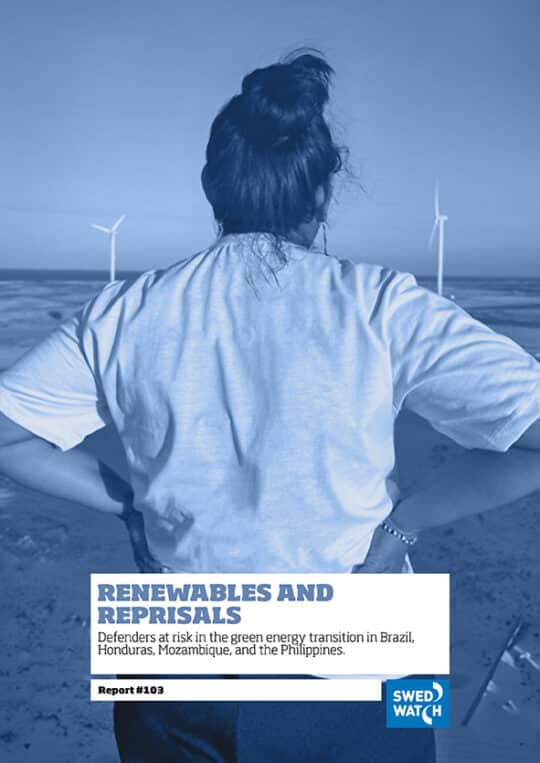
The report 👆🏼 is authored by Swedwatch with input from Instituto Terramar, Red de Abogadas Defensoras de Derechos Humanos and Jalaur River for the People’s Movement, and Swedwatch’s member organisations Afrikagrupperna, ACT Church of Sweden, Diakonia, Solidarity Sweden-Latin America and the Swedish Society for Nature Conservation.
The report is also available in Spanish and Portuguese.
Company responses can be found beneath each case listed below.
The renewable energy transition cannot succeed without the people who defend land, rights, and the environment. These defenders are not standing in the way – they’re showing us the way. Ignoring their voices doesn’t just fuel injustice, it undermines the very foundations of a just and sustainable future. /Alice Blondel, Director, Swedwatch
Mapping risks
The maps below show countries/regions with the highest prospective solar and wind farm capacities (MW) alongside civic space status. Comparing civic space, with prospective solar and wind farm capacities helps identify where defenders may face heightened risks — and where businesses and states must ensure their protection.
The maps use civic space data from CIVICUS and projections of wind and solar expansion from the Global Energy Monitor and TransitionZero.
Four cases highlighting severe civic restrictions

Brazil: Wind power
Lack of consultations
The project: The Bons Ventos wind farm, located on Brazil’s northwest coast, is one of the country’s largest. In 2010 it received a $50 million loan from the Nordic Investment Bank, co-financed by Brazilian development banks. The project incorporated advanced technology from Nordic and Baltic companies. Originally owned by Bons Ventos Geradora de Energia S.A., it was sold in 2012 to its current operator, CPFL Energias Renováveis.
Reported concerns: Impacted communities, which include marginalised groups, traditional fishing, and quilombola communities, were not properly involved in consultations. Defenders decided to remain anonymous in the interviews out of fear of reprisals, citing increasing threats and violence against defenders in the past years.
When the wind farm was installed, we were taken by surprise. The company came and showed no respect for the people who lived in our community (...) They came without information, without explanation./Anonymous interviewee, fearing reprisals.
Read the full case.
Read the company responses from NIB and BNDES.
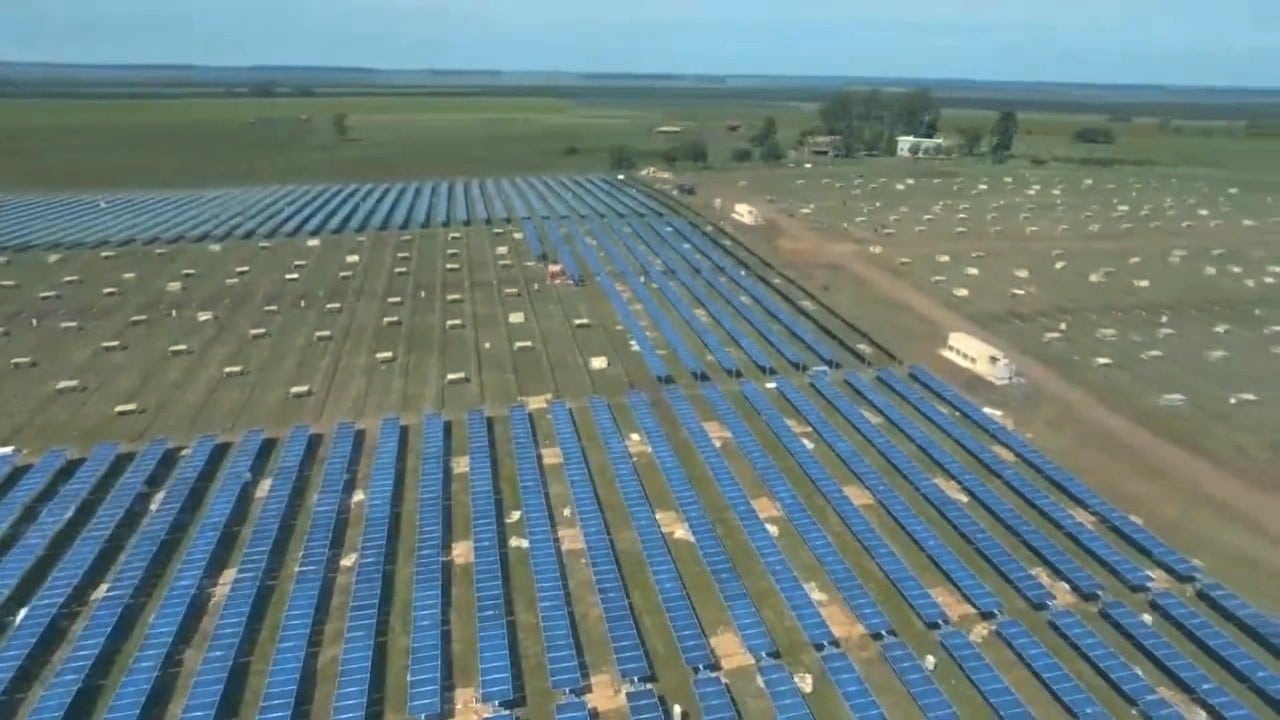
Honduras: Solar power
Retaliation against opponents
The project: Honduras plans to reach 80% renewable energy by 2038, focusing on solar power. Supported by the Norwegian development finance institution and pension fund KLP, the Norwegian company Scatec is developing solar projects in the southern Choluteca region.
Reported concerns: Local communities have raised concerns over the lack of consultation. Reports highlight retaliation against opponents, including drone surveillance, persecution, and hostility from private security guards. Women human rights defenders have faced legal intimidation, including Strategic Lawsuits Against Public Participation (SLAPPs) for their criticism. Additionally, defenders have been targeted by smear campaigns, limiting their ability to speak out.
When the solar power projects came to their territories the communities had no information and thought it was an expansion of the sugar cane farm nearby. /Denia Castillo, Red de Abogadas Defensoras de Derechos Humanos
Read the full case.
Read the company response.
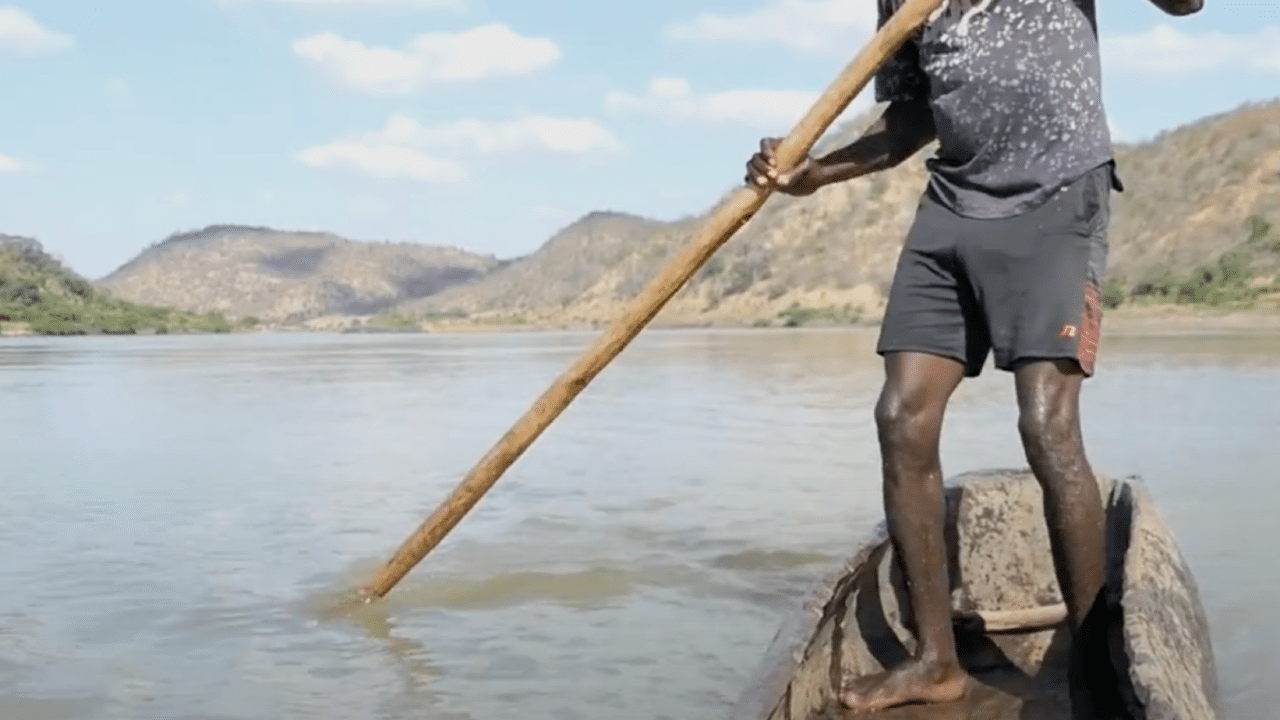
Mozambique: Hydropower
Lack of access to information
The project: The Mphanda Nkuwa hydropower project on the Zambezi River will generate 1,500 MW. The Mozambique’s government has signed a development agreement involving Electricidade de Moçambique and Hidroeléctrica de Cahora Bassa, which jointly own 30% of the project. The remaining 70% is held by a consortium led by Électricité de France, TotalEnergies, and Sumitomo Corporation.
Reported concerns: Planning of the project has been marred by inadequate social and environmental impact assessments, lack of transparency, and suppression of civic engagement. Defenders have reported threats, violation of freedom of assembly and an overall disregard for their right to participate in decision-making processes.
People have the right to say yes or no to this project, but they have not been asked. And to be able to answer they need to have access to all the relevant information (...) but instead they only hear false promises of a ‘better life’. /Anabela Lemos, Director of Justiça Ambiental!
Read the full case.
Read the company response.
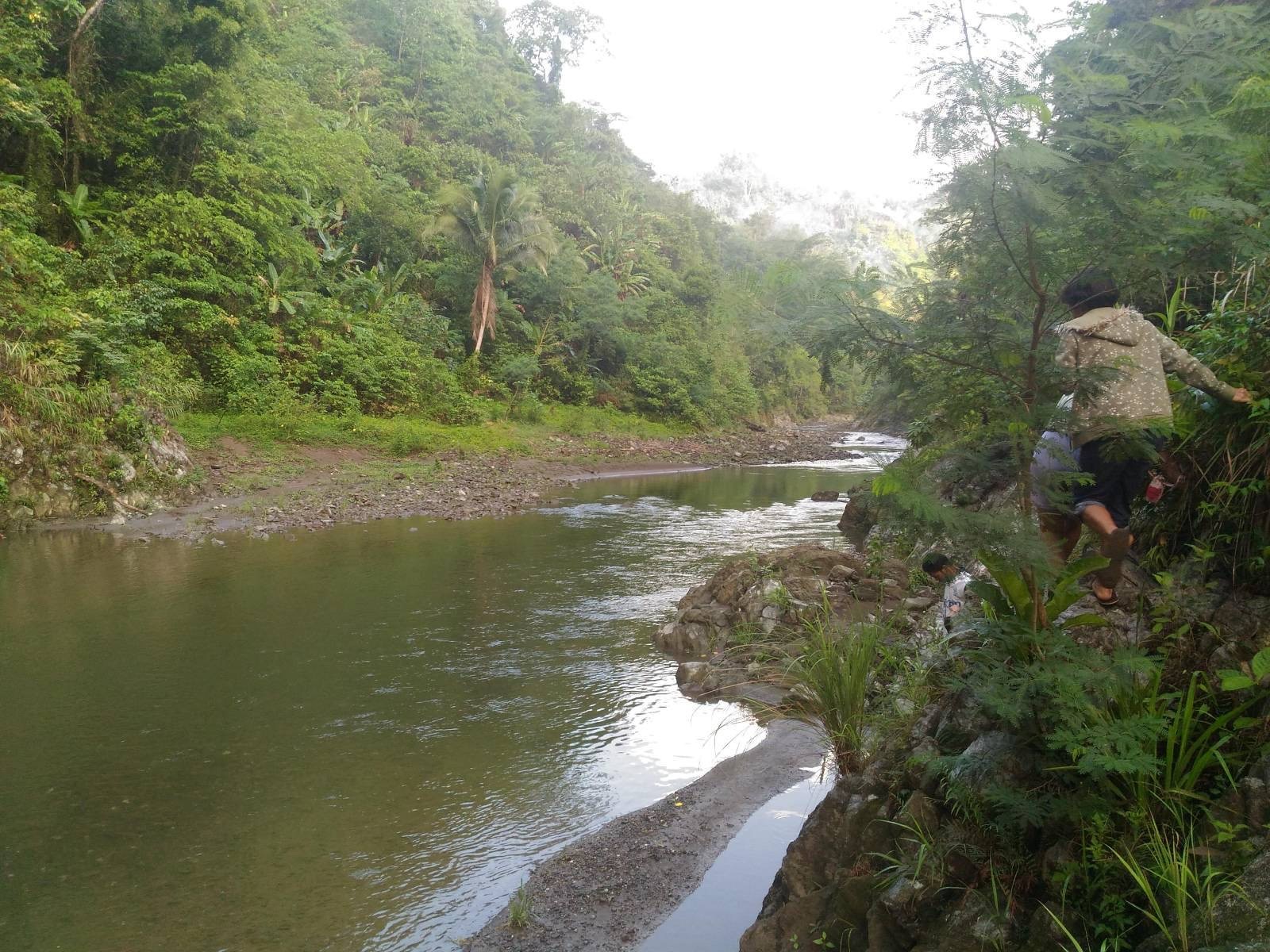
The Philippines: Hydropower
Red-tagging and persecution
The project: The Jalaur River Multipurpose Project is one of many hydropower projects in the Philippines and the first large-scale water reservoir in the Visayas and Mindanao regions. Phase one focuses on rehabilitating four existing river irrigation systems in Iloilo, while phase two involves constructing three dams and infrastructure. The National Irrigation Administration and has signed a 212 billion USD contract with Daewoo Engineering and Construction Co. Ltd. to develop the project
The National Irrigation Administration signed a $212 billion contract with Daewoo Engineering and Construction Co. Ltd. for its development.
Reported concerns: Community leaders from the Tumandok communities faced threats, harassment, and even killings following police and military raids on their communities after they had criticized the project. Defenders reporting on the dam project documented persecution and "red-tagging"— government accusations of being communist insurgents — creating an environment of fear and impunity.
The Tumandok communities were militarised and harassed, intimidated and threatened every day because of their strong opposition to the mega dam project. Some were offered bribes just to agree to the project. Others were threatened with charges under the terrorist law. /John Ian Alenciaga, the Jalaur River for the People's Movement.
Read the full case.
Swedwatch contacted Daewoo for comment, but they didn't issue a response.
Video
Defenders at risk
Renewable energy is crucial, but must not come at the cost of human rights. Around the world, defenders protecting land and communities from harmful projects face threats. A truly sustainable future must be just—respecting people, nature, and their rights.
